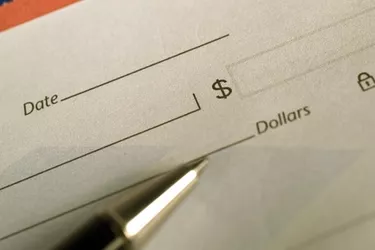
When you need a payment method that guarantees the funds you're paying someone, certified checks and money orders are two common alternatives to less convenient options like cash and less secure methods like personal checks. While certified checks are one of the different types of checks banks issue, money orders are more widely accessible since you can obtain them from plenty of places besides banks. Take a look at how to obtain both certified checks and money orders as well as when to use each of them.
Getting a Certified Check
Video of the Day
You can usually go to your credit union or bank to obtain a certified check. Since the bank will set aside the check's amount in your account when they issue the certified check, you'll need an active account there.
Video of the Day
If you don't have a bank account or your financial institution doesn't issue certified checks, you might request a cashier's check instead. When getting a cashier's check, you give the bank the money, the bank puts the funds in their own account and they issue you a check guaranteeing the money.
When you head to your financial institution, you'll need your account information such as your account number and your driver's license so the bank can verify your identity. The bank teller will get information from you so they can print the check, and this includes the recipient's name, check amount and any memo. You'll sign the check, and the bank will designate it as certified. You might pay as much as $15 for this service unless your bank waives the charge.
Consider also: How to Verify if a U.S. Postal Money Order Is Real
Unlike when obtaining a certified check, you won't need to have a bank account to get a money order since you can just pay with cash or use a debit card.
Purchasing a Money Order
If you need a money order, you can go to a financial institution, local post office, money transfer agency like Western Union or even a grocery store like Walmart. Other possible locations to buy money orders include pharmacies, check-cashing stores and gas stations.
Unlike when obtaining a certified check, you won't need to have a bank account to get a money order since you can just pay with cash or use a debit card. However, note that the limit for a money order is usually no more than $1,000.
When going to a place to buy a money order, you can request the money order for a specific amount, present your payment method and possibly show your driver's license or another identifying document if the worker wants to verify you. While the amount will be printed on the money order, you'll need to fill out the rest of the information like the payee's name, both of your addresses, any memo and your signature by hand. You can expect to pay a low money order fee; for example, this is up to $1.75 at the post office and $1 at Walmart.
Consider also: What Does Memo on a Money Order Mean?
Certified Check vs. Money Order
Since both certified checks and money orders get backed by the institution issuing them, they both offer assurance to the payee. They're both easy for the payee to cash since they can use locations such as a bank, grocery store or check-cashing store to get the funds. However, these payment options differ in that money orders usually cost much less than certified checks. Further, money orders are easier to get, especially if you don't have a banking relationship.
A key consideration when deciding on a certified check vs. money order involves the amount of money you need to pay someone. Keep in mind that money orders top out around $1,000, while certified checks can work for thousands of dollars. For example, if you just needed to pay your $200 cable bill, then a money order would do the job fine. However, if you're putting $5,000 down on a new car, you'd need a certified check for such an amount.
Consider also: When Does a Money Order Expire?
- KeyBank: Cashier's Check vs Certified Check: What’s the Difference?
- Cornell Law School: Certified Check
- Capital One: What Is a Cashier’s Check?
- Western Union: A Money Order Is the Right Solution When Cash or a Check Won’t Cut It
- Walmart: Money Orders
- USPS: Sending Money Orders
- Huntington: How to Fill Out a Money Order
- Huntington: Cashier’s Check vs Money Order